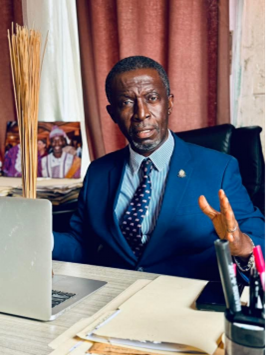By New Dawn
Copyright thenewdawnliberia

Ex-presidential candidate Cllr. Tiawan Gongloe launches Albert Porte Street Lecture Series here to promote public enlightenment.
By Lincoln G. Peters
Monrovia, Liberia; September 22, 2025 – Former Presidential Candidate and renowned Liberian human rights lawyer, Cllr. Tiawan Saye Gongloe has launched the Albert Porte Street Lecture Series at the Center for the Exchange of Intellectual Opinion (CEIO) in Monrovia.
The official launch brought together intellectuals, academia, youth, student activists, and movements, as well as pedestrians. During the lecture series over the weekend, Cllr. Gongloe delved deeper into Liberian history, politics, and law.
Providing an overview of the Albert Porte Street Lecture Series, Cllr. Gongloe said he has observed over the years that young Liberians are thirsty for vital information about Liberian history, basic laws, and politics – past and present.
Accordingly, he added that to fill this void, he has decided to provide street education as a way of reducing the level of ignorance among young people, noting that to this end, he has decided to begin with the Center for Intellectual Exchange on Carey Street (CIEO)
Commenting briefly on settlement history, he reflected that from December 15–19, 1821, the first group of African American settlers sponsored by the American Colonization Society (ACS) arrived off the coast of Liberia aboard the ship Elizabeth.
He explained that in the historical context, they (Settlers) first anchored at Sherbro Island (today in Sierra Leone, just northwest of the Liberian coast).
“That location turned out to be unhealthy — many settlers and ACS agents died of malaria and other diseases. In 1822, surviving settlers moved southward and established a settlement at Cape Mesurado, which became Monrovia (named after U.S. President James Monroe). So, December 19, 1821, marks the date of arrival of the Elizabeth with the first organized group of settlers, though the permanent settlement on Liberian soil began in 1822 at Cape Mesurado.” He detailed.
Cllr. Gongloe narrated that on December 19, 1821, sources agreed there was activity in December 1821, including land purchases, agents arriving, and that the Elizabeth and Nautilus ships were involved in the early years.
But he argued that none of the reliable sources he found so far confirm the exact date, December 19, 1821, as the arrival of the first settlers on the coast of Liberia, noting that it may be a date given in some narratives, possibly in less-authoritative accounts or family histories, but not confirmed in sources he reviewed.
Providing brief information as to who the settlers met or negotiated with for Land, he pointed out that the American Colonization Society (ACS) sent Dr. Eli Ayers (agent of the ACS) together with Lieutenant Robert F. Stockton of the U.S. Navy, to negotiate acquiring land for a settlement at Cape Mesurado.
“They negotiated with local leaders (“chiefs” or “kings”) of indigenous groups in the Cape Mesurado area, including the Dei, Bassa, Kru, and others. One prominent local ruler was Zolu Duma, also called “King Peter.” Other chiefs mentioned include “Jimmy,” “Long Peter,” “George,” and “Zoda,” among others. The written agreement/deed was signed by Ayers and Stockton, as well as by those local leaders. What Land Was Purchased and Its Area. The land purchased was at Cape Mesurado, including the coastal headland and adjacent portions, and also Dozoa Island (also called “Perseverance” / “Providence” Island) in the bay.” He stated.
Commenting on what was paid for the land, Cllr. Gongloe disclosed that the payment was not in cash (in most accounts), but rather in trade goods, supplies, rum, guns, gunpowder, tobacco, and trinkets. Approximate value given in many sources is US$300 worth of goods (rum, weapons, supplies, etc.).
“Some accounts mentioned paying in clothes, trinkets, rum, tobacco, weapons, etc. Some sources say the size of the land was forty miles and 150 acres along the coast.” He concluded.
The lecture series is named in honor of late Liberian Social Justice Activist and Pamphleteer, Albert Porte. Editing by Jonathan Browne